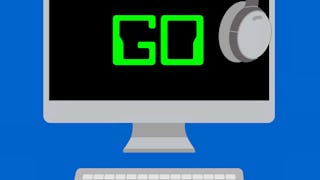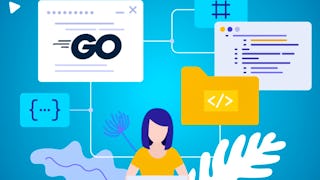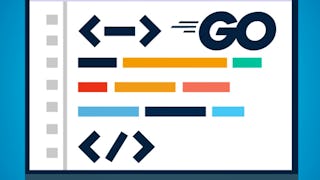This course is for individuals with previous programming experience in languages like C, Python, or Java, who are looking to learn a modern, efficient language. Learning Go will equip you with skills highly valued in backend development and system programming, enhancing your career prospects in these growing fields.



Getting Started with Go
This course is part of Programming with Google Go Specialization

Instructor: Ian Harris
80,283 already enrolled
Included with 
(2,452 reviews)
What you'll learn
Implement fundamental Go programs and understand its core elements.
Work with Go data types, including basic, composite, and JSON structures.
Utilize remote function calls (RFCs) and JSON for data manipulation in Go.
Set up your Go programming environment and practice writing Go code.
Skills you'll gain
Details to know

Add to your LinkedIn profile
See how employees at top companies are mastering in-demand skills

Build your subject-matter expertise
- Learn new concepts from industry experts
- Gain a foundational understanding of a subject or tool
- Develop job-relevant skills with hands-on projects
- Earn a shareable career certificate

There are 6 modules in this course
What's included
1 reading
Learn the basics of Go, an open source programming language originally developed by a team at Google and enhanced by many contributors from the open source community. This is the first in a series of three courses comprising the Programming with Google Go specialization. It is designed for individuals with previous programming experience using such languages as C, Python, or Java, and covers the fundamental elements of Go. Topics include data types, protocols, formats, and writing code that incorporates RFCs and JSON. Most importantly, you’ll have a chance to practice writing Go programs and receive feedback from your peers. Upon completing this course, you’ll be able to implement simple Go programs, which will prepare you for the remaining two courses in this specialization: Functions, Methods, and Interfaces in Go and Concurrency in Go.
What's included
1 video1 reading
Welcome to a module, where you'll get started with Go programming! You'll discover the advantages of using Go and begin exploring its core features. We'll guide you through installing the Go programming environment on your computer, culminating in writing your very first 'Hello, World' program. Ensure your Go programming environment is correctly set up for a smooth learning experience.
What's included
9 videos1 assignment1 peer review
Now that you've set up your Go programming environment, you're ready to dive into fundamental data types. This module introduces basic data types in Go, such as floating-point numbers and strings, and gives you practice writing routines to manipulate them. Mastering these data types is crucial for building robust Go programs. Focus on understanding each data type's use cases through the coding exercises.
What's included
11 videos1 reading1 assignment2 peer reviews
Building on your knowledge of basic data types, this module introduces more complex composite data types in Go, including arrays, slices, maps, and structs. You'll gain hands-on practice writing code that effectively uses these structures to organize and manage data. Pay close attention to how these structures organize data for efficient programming, which is key for real-world Go applications.
What's included
7 videos1 assignment1 peer review
This final module of the course introduces the use of remote function calls (RFCs) and JavaScript Object Notation (JSON) in Go. You’ll learn how to access and manipulate data from external files, and have an opportunity to write several routines using Go that exercise this functionality.
What's included
5 videos2 peer reviews
Earn a career certificate
Add this credential to your LinkedIn profile, resume, or CV. Share it on social media and in your performance review.
Instructor

Offered by
Explore more from Software Development
 Status: Free Trial
Status: Free TrialUniversity of California, Santa Cruz
 Status: Free Trial
Status: Free TrialEdureka
 Status: Free Trial
Status: Free TrialEdureka
 Status: Free Trial
Status: Free TrialUniversity of California, Irvine
Why people choose Coursera for their career




Learner reviews
2,452 reviews
- 5 stars
71.85%
- 4 stars
20.18%
- 3 stars
4.73%
- 2 stars
1.99%
- 1 star
1.22%
Showing 3 of 2452
Reviewed on Mar 14, 2021
I thank Professor Ian Harris for her excellent knowledge.And thank you to the coursera for providing this good course.This course was great and helped me a lot.I wish success to the coursera team.
Reviewed on Sep 21, 2019
It's wonderful Course to get started with Golang. Assignments and Quiz are extremely helpful to practice and enhance the knowledge. I strongly recommend to enrol this course.
Reviewed on Apr 5, 2020
Great intro. If you already know the basics, you probably don't need this course though. Not much of a deep dive, more of a "skim the surface" type course. Week 4 on IO was the most beneficial for me.

Open new doors with Coursera Plus
Unlimited access to 10,000+ world-class courses, hands-on projects, and job-ready certificate programs - all included in your subscription
Advance your career with an online degree
Earn a degree from world-class universities - 100% online
Join over 3,400 global companies that choose Coursera for Business
Upskill your employees to excel in the digital economy
Frequently asked questions
Go (or Golang) is an open-source programming language developed by Google, known for its efficiency, simplicity, and strong support for concurrency. Learning Go is beneficial for building scalable network services, cloud-native applications, and system tools, making it a valuable skill for modern software development.
This course is designed for individuals with prior programming experience in languages such as C, Python, or Java. A basic understanding of programming concepts is essential to succeed.
You will gain practical skills in implementing fundamental Go programs, working with Go's basic and composite data types, and utilizing protocols like RFCs and JSON for data manipulation. You'll also learn to set up your Go programming environment.
More questions
Financial aid available,
¹ Some assignments in this course are AI-graded. For these assignments, your data will be used in accordance with Coursera's Privacy Notice.

